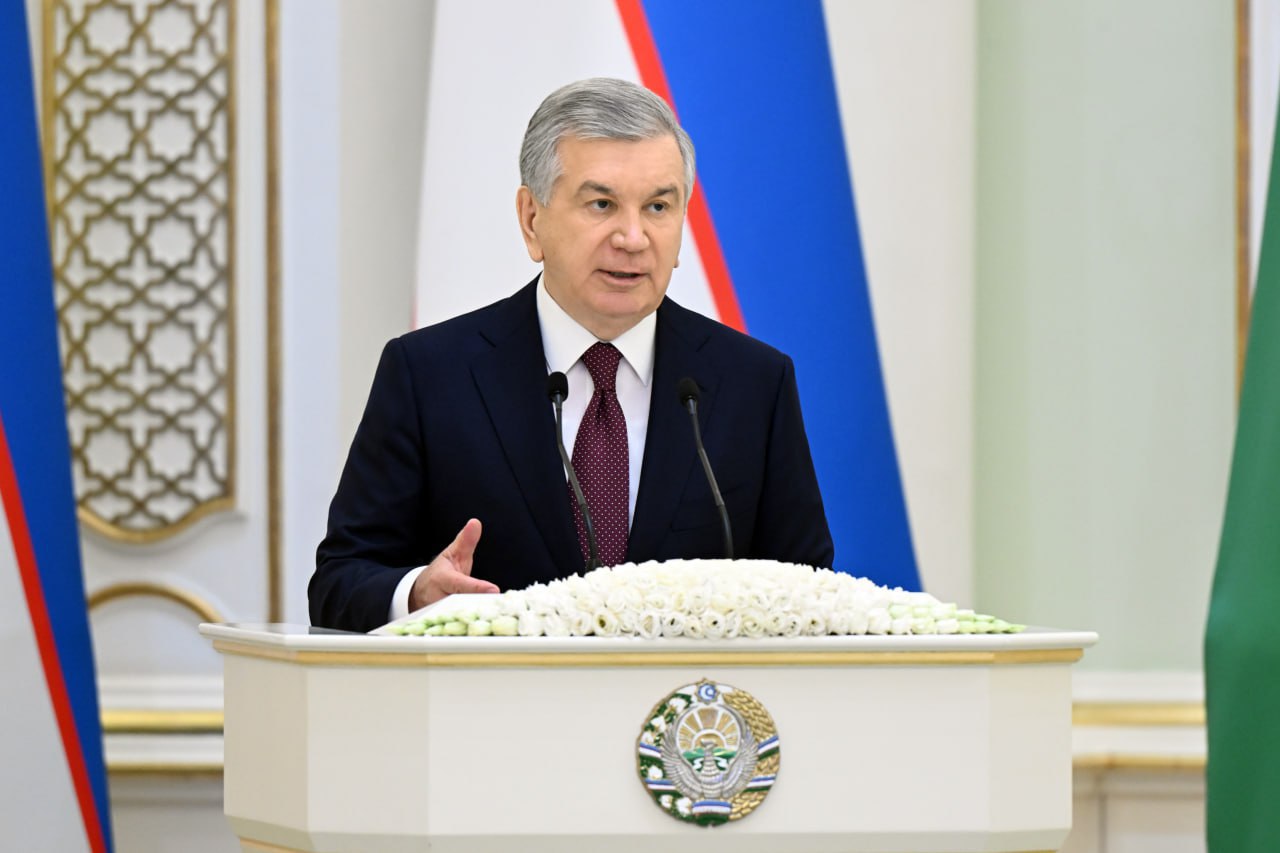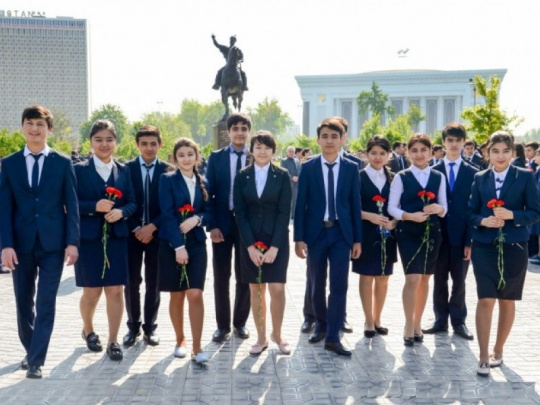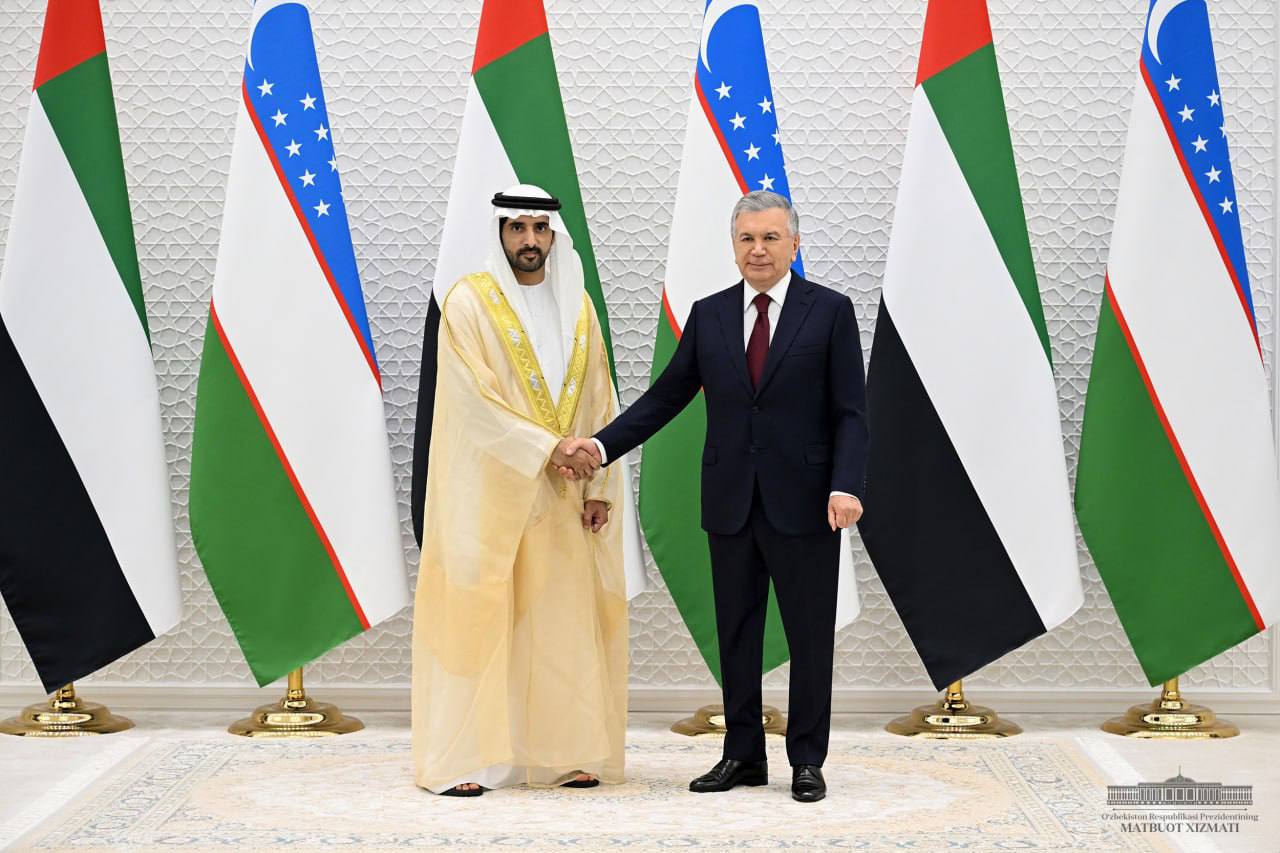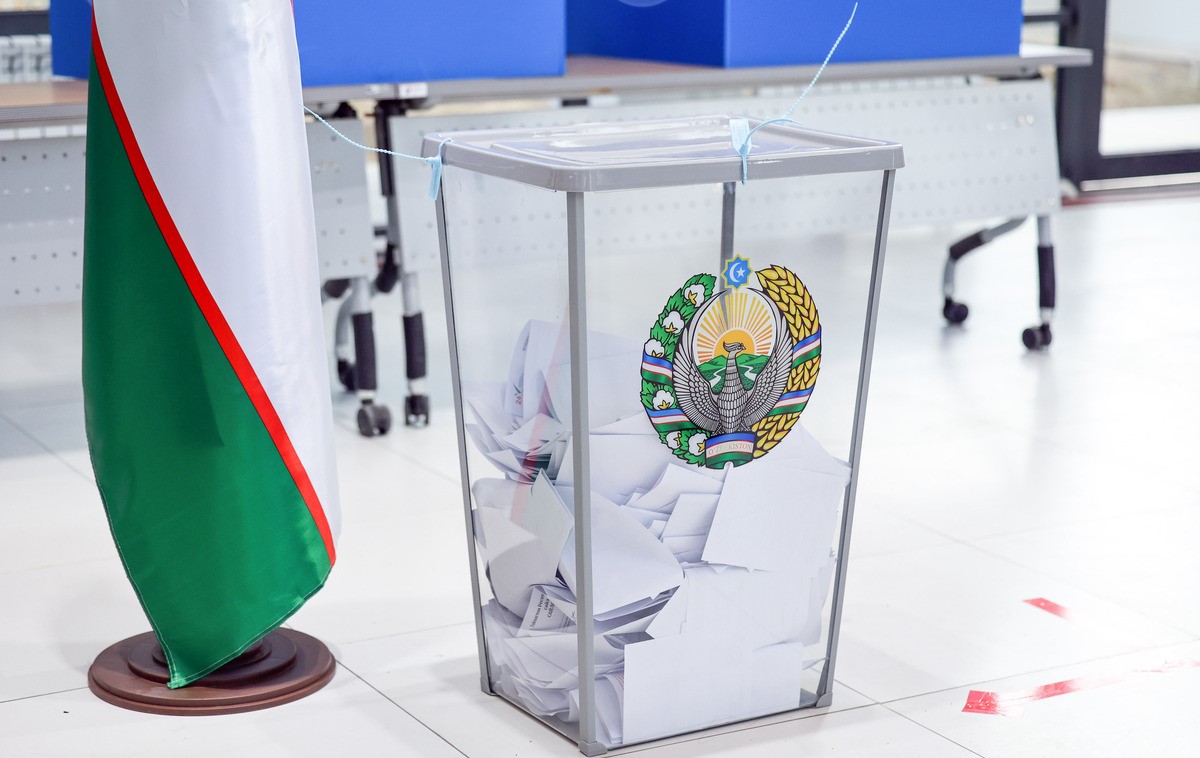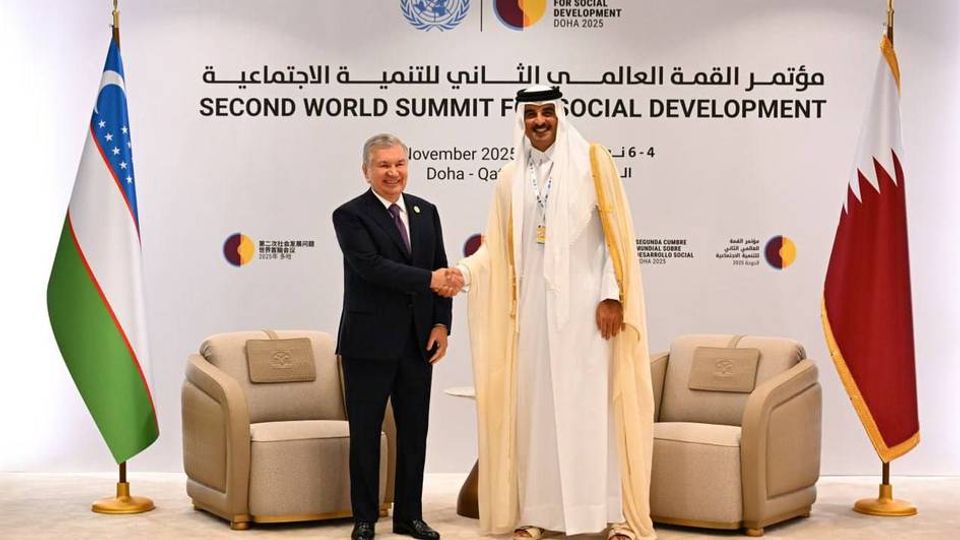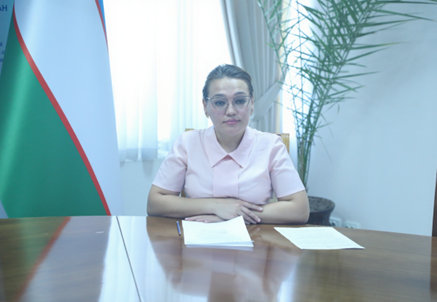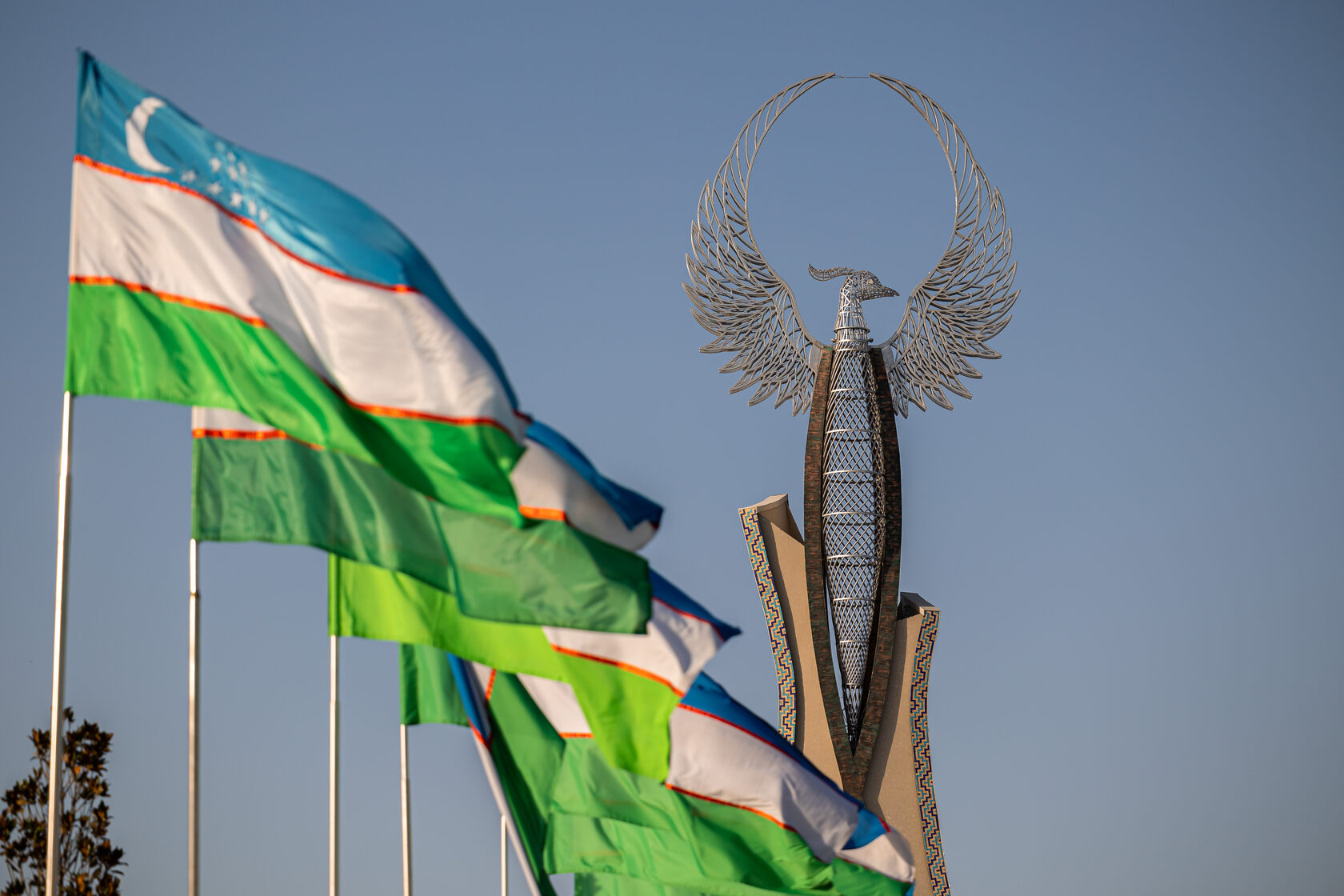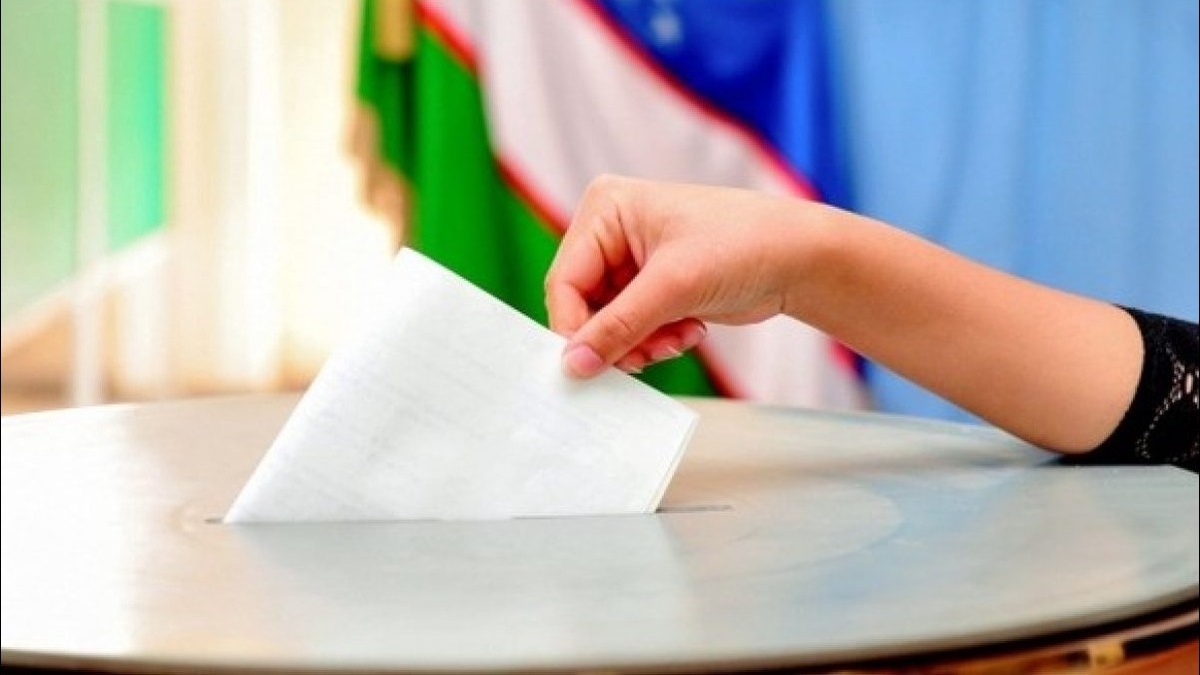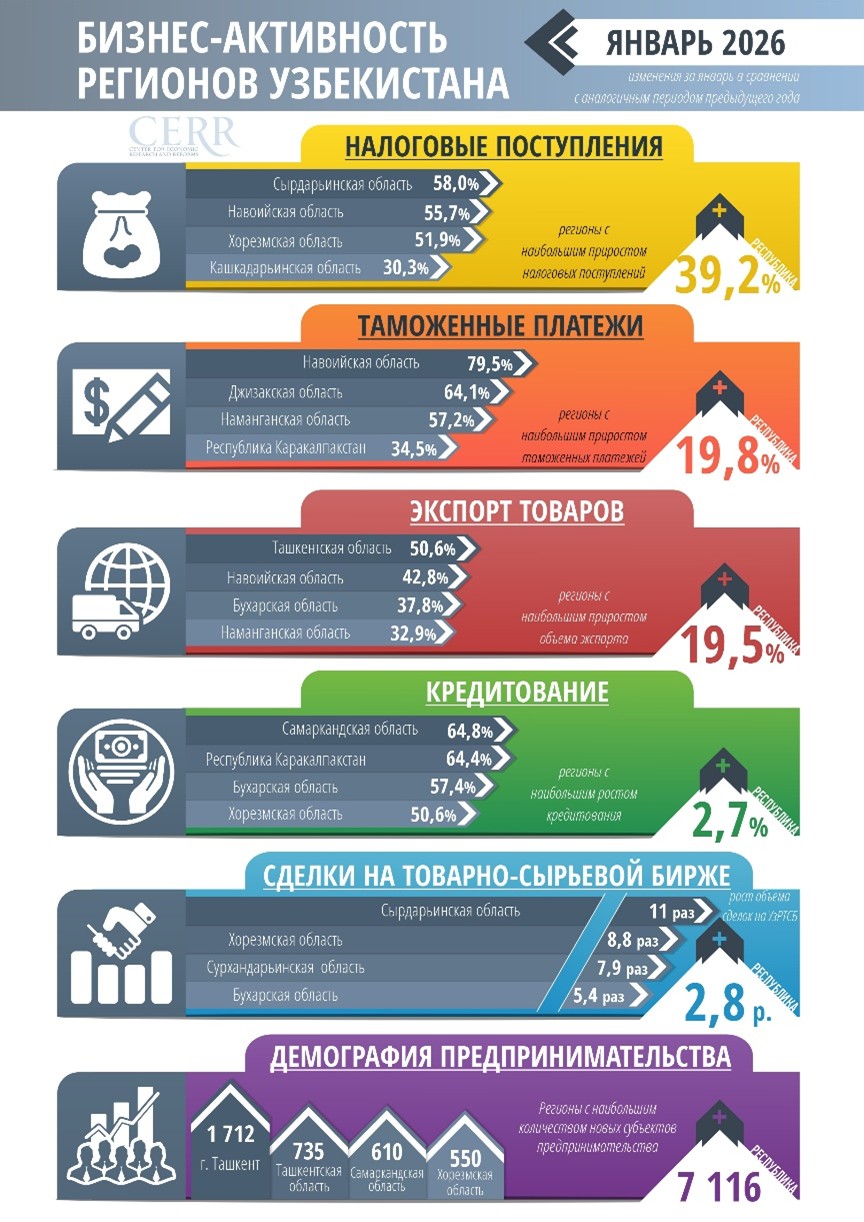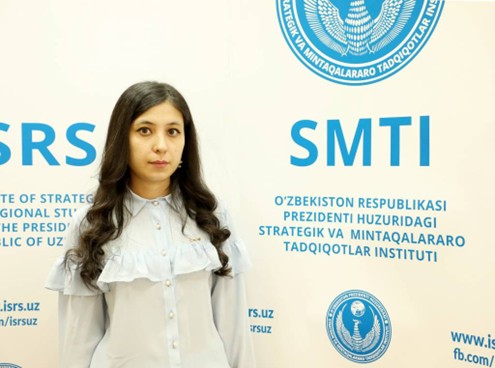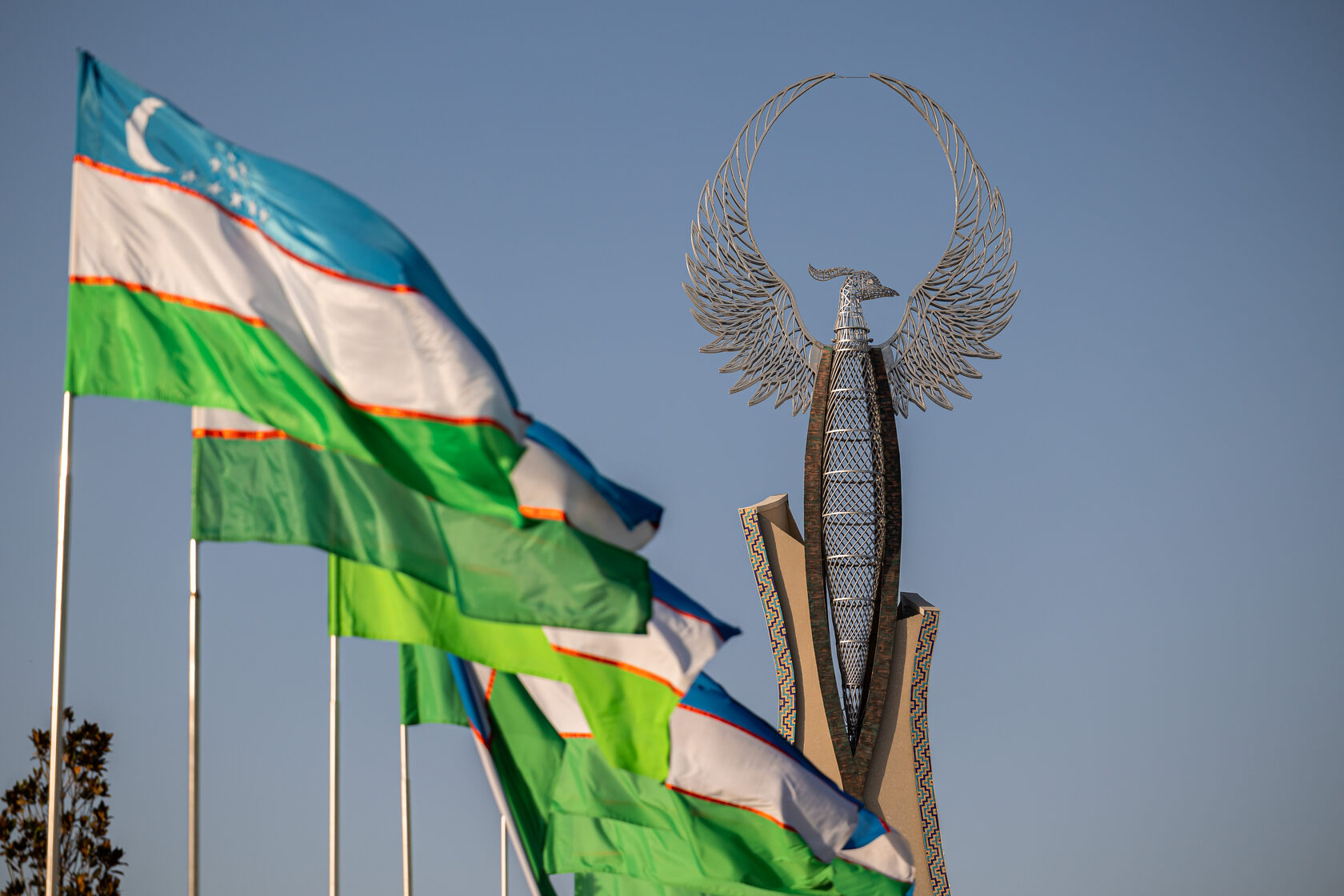Phone
Consular Issues
Phone
Uzbekistan news
We recommend
President of Uzbekistan: The time has come for a new generation of diplomats – those who achieve concrete results and firmly defend the interests of Uzbekistan in the international arena
📅 22.01.2026
The Head of State identified priorities for updating the activities of the Ministry of Foreign Affairs and foreign diplomatic missions
On January 15, an expanded meeting was chaired by President Shavkat Mirziyoyev on the activities of the Ministry of Foreign Affairs and diplomatic missions abroad, reports Dunyo IA correspondent.
Opening the session, the Head of our state noted that the meeting is taking place amid sharp geopolitical changes in the world and increasing threats to the sovereignty of states. In this regard, the need to critically assess current foreign policy activities and move to a renewed format for organizing the work of the Ministry of Foreign Affairs and foreign diplomatic missions was emphasized.
President noted that 2025 had been a productive year for the country's foreign policy. During the year, high-level visits were made to 26 foreign countries, and for the first time in recent history, visits to Uzbekistan were organized by the leaders of a number of countries. Multilateral dialogues in the “Central Asia Plus” format became productive. In recent years, strategic partnerships have been established with 11 countries, bringing the total number to 19, and allied relations have been built with Kazakhstan, Azerbaijan, and Tajikistan.
– As a result of an open, pragmatic, thoughtful and proactive foreign policy, Uzbekistan is consistently strengthening its position as one of the global centres of peace and diplomacy, – emphasized President.
Since 2017, 16 new diplomatic missions and consulates have been opened abroad, bringing their total number to 60, and the number of countries with which diplomatic relations have been established to 165. There has also been an increase in the number of staff and salaries of employees of embassies, consular offices, representative offices to international organizations and employees of the Ministry of Foreign Affairs.
At the same time, a fundamental question was raised as to whether all diplomatic missions are making full use of the opportunities provided.
– In the current environment, an ambassador is not just a person who conducts political dialogue. An ambassador is a state representative who attracts investment and technologies, opens new export markets, launches transport and logistics corridors, increases tourist flows, creates conditions for legal labor migration and, most importantly, protects the rights of our citizens, - emphasized President.
In this regard, it was noted that key performance indicators for ambassadors should include the volume of export revenues from the countries of residence, growth in tourist flows and the effectiveness of organizing legal labor migration.
Particular emphasis was placed on the need to increase exports and investments by strengthening economic diplomacy.
As part of bilateral and multilateral events in 2025, agreements were signed on investment projects and trade contracts totaling $160 billion. For the first time in history, foreign trade turnover exceeded $80 billion, exports reached $33,5 billion, and foreign investment exceeded $43 billion. Exports to 75 countries increased by almost $4,5 billion.
In view of this, the ambassadors have been tasked with expanding export deliveries to the Middle East, Europe, Asia, and Africa, as well as implementing specific projects in the fields of industry, agriculture, the chemical industry, the textile industry, greenhouse farming, and the service sector. At the same time, it was noted that Uzbekistan's products remain insufficiently recognized in certain markets.
It was noted that the growth of logistics costs has a negative impact on the competitiveness of domestic products. In this regard, the need to diversify transit routes, optimize logistics chains, and develop additional proposals to reduce transportation costs when entering European markets was indicated.
In the agricultural sector, tasks have been set for researching and implementing water-saving technologies, modern agricultural technologies, and innovative greenhouse solutions. Along with this, measures have been outlined to expand export markets for chemical industry products, bring domestic manufacturers up to international standards and requirements, and organize specialized exhibitions and presentations.
The need to intensify trade and economic cooperation with the African continent as one of the promising new export destinations has been emphasized. To this end, a clear roadmap is to be developed with the participation of relevant ministries and foreign diplomatic missions.
It was noted that ambassadors should be directly interested in finding promising projects, attracting them, and implementing them in practice. In this regard, it was decided to introduce financial incentives for ambassadors who bring specific investment or export projects to a logical conclusion.
Criticism was levelled at the insufficient realisation of existing potential in a number of areas. In particular, it was noted that opportunities to attract international grants are not being fully exploited. It was noted that with closer and more systematic interaction between ministries, industry leaders, and ambassadors, it would have been possible to attract an additional $200-300 million in grant funds last year.
As noted, international organizations and donor countries announce grant programs worth approximately $200 billion annually. In this regard, the task has been set to implement a unified, systematic and effective approach to working with grants.
In addition, the need to take concrete measures, together with the ambassadors to the United States, the United Kingdom, Germany, Switzerland, China, Japan and Singapore, to attract leading foreign universities ranked in the top 100 worldwide as partners of Uzbek higher education institutions was emphasized.
It was noted that cooperation between regions and diplomatic missions in expanding foreign economic relations is still insufficient. The need for active participation of regional governors, together with ambassadors, in the systematic promotion of export-oriented products of the regions and in facilitating the entry of local enterprises into foreign markets was emphasized.
Providing Uzbek citizens with legal and high-paying jobs abroad was identified as another priority area. The expansion of the geography of organized labor migration was noted, while it was pointed out that in a number of countries, work in this area is not sufficiently effective and relevant instructions were given in this regard.
It was emphasized that embassies and consulates should actively protect the rights and legitimate interests of citizens and provide qualified legal assistance in each specific case. The task has been set to abandon "office diplomacy", strengthen work in the field and establish direct dialogue with compatriots.
In the field of tourism, the need to further strengthen the role of ambassadors, introduce new approaches to promoting the country's tourism and cultural potential, make effective use of visa-free regimes and attract international outsourcing companies has been identified.
Issues related to expanding foreign policy ties, high-quality and timely preparation of high-level visits, retraining of diplomatic personnel, and the formation of a reserve of promising specialists were also discussed.
The intensification of foreign information policy and the improvement of the country's international image through systematic work with foreign media and the implementation of special media projects were identified as priority tasks.
The need to update the Concept of foreign policy of the Republic of Uzbekistan, review its priority areas, and define clear tasks for protecting national interests and strengthening the country's position in the international arena was emphasized.
As the President noted, the new concept should comprehensively reflect long-term strategic goals, the logic of internal reforms as well as national interests in the areas of economic diplomacy, security, investment, exports, transport and logistics, water and climate issues.
In order to give proper recognition to the achievements of diplomats, it was proposed to establish the honorary title of “Honored Diplomat of the Republic of Uzbekistan".
At the end of the meeting, President Shavkat Mirziyoyev emphasized: “The time has come for a new generation of diplomats – those who achieve concrete results and firmly defend the interests of Uzbekistan in the international arena”.
In the course of the session, reports and proposals of our ambassadors abroad were heard.
Dunyo IA
Uzbekistan: A Course for Continuing Intensive Reforms in Youth Policy
📅 03.07.2024
Uzbekistan is a country of youth. According to statistical data, about 60% of Uzbekistan's population is under the age of 30. Thus, over 18 million residents of Uzbekistan are young people, and by 2040 this number could reach 25 million. This creates unique opportunities and specific challenges for the state in terms of providing education, employment, and social integration for the youth. On February 21 of this year, a Presidential Decree approved the State Program for the implementation of the "Uzbekistan - 2030" Strategy in the Year of Support for Youth and Business. It outlines a number of tasks aimed at addressing the problems faced by young people and realizing their potential.
In recent years, Uzbekistan has prioritized creating favorable conditions to ensure the rights and interests of the younger generation. This includes providing them with access to quality education, meaningful employment opportunities, and avenues to realize their talents and abilities. Significant efforts have been made in this direction as part of state policy.
A vivid confirmation of this is the adoption and consistent implementation of over 100 legislative acts concerning this sphere within a short period. The inclusion of specific articles on the rights and interests of the younger generation in the updated Constitution of Uzbekistan undoubtedly opens new opportunities for further strengthening the legal framework and elevating practical work in this area to a new level.
During the past period, a completely new vertical management system for working with youth has been established.
In all neighborhoods (mahallas) of the country, youth leaders are active. Thanks to this system, over 100 different opportunities have been created for youth within the neighborhoods.
A system called the "Youth Notebook" has been established, through which over 1.1 million young people have received assistance across
25 different areas totaling 1.3 trillion UZS. Specifically, tens of thousands of students from low-income families have had their tuition fees covered under fee-based contracts.
The number of higher educational institutions in the country has almost tripled, reaching 199, and enrollment has increased from 9 to
38 percent. This expansion opens up extensive opportunities for youth to acquire modern knowledge and professions.
In the country, 210 youth industrial and entrepreneurial zones have been established, with 2,500 projects implemented amounting to 4 trillion UZS. As a result, the number of young entrepreneurs has doubled, surpassing 200,000.
In recent years, more than 750 young people who make a significant contribution to the prosperity of the Motherland have received state awards.
It is heartening that the youth of the country are effectively utilizing the opportunities provided and inspiring with their achievements in various fields.
For further effective implementation of State youth policy in Uzbekistan, it is necessary to continue effective reforms to create a solid organizational, legal and institutional framework.
First of all, work will continue to develop new constitutional norms on the rights of young people in existing legislation.
At the same time, in the coming period, special attention will be paid to the qualitative execution of tasks defined in the State Program on the implementation of the Strategy "Uzbekistan - 2030" in the Year of Support for Youth and Business.
Thus, every region, ministry and department has begun to introduce a new approach to work with young people. The improvement of scientific and analytical work on the study of youth problems and the training of promising personnel is considered relevant.
Today, rapid measures are being taken to increase the number of young people learning foreign languages under the "Ibrat Farzandlari" project
to 1 million, and the number of young readers under the "Mutolaa" program up to 1.5 million. Additional infrastructure is being built in the regions for this purpose. At the same time, special attention should be paid to the creation of broader conditions for the meaningful organization of leisure activities and the realization of young people's talents and abilities.
Thus, the systemic reforms carried out in Uzbekistan have led to significant achievements in the field of education and the spiritual, intellectual, physical and moral development of young people. The increase in the number of educational institutions, the improvement in the quality of education, the active participation of young people in scientific and cultural events, and the implementation of social projects - all this is evidence of positive changes and the strengthening of the foundations for the harmonious development of the younger generation.
Bekzod Jurabayev,
Chief scientific researcher of the Institute of Legislation and Legal Policy under the President of the Republic of Uzbekistan, Chairman of the Council of Young Scientists of the Institute
President of Uzbekistan considers promising areas and projects of cooperation with UAE
📅 30.09.2024
Issues of further development of multifaceted partnership, promotion of economic and investment cooperation projects, establishment of practical interaction in the defense sector were discussed at the meeting between President of the Republic of Uzbekistan Shavkat Mirziyoyev and a delegation from the United Arab Emirates headed by Deputy Prime Minister, Minister of Defense, Crown Prince of the Emirate of Dubai Sheikh Hamdan bin Muhammad Al Maktoum.
The Emirati delegation included the Ministers of Government Affairs Muhammad bin Abdullah Al Gergawi, Energy and Infrastructure Suhail bin Muhammad Al Mazroui, Economy Abdullah bin Tuq Al Marri, and Minister of State for Artificial Intelligence and Digital Economy Omar bin Sultan Al Olama.
At the beginning of the conversation, Sheikh Hamdan Al Maktoum expressed his sincere gratitude to our Head of State for the warm welcome and conveyed warm greetings from UAE President Sheikh Mohammad Al Nahyan and Prime Minister of the UAE, Emir of Dubai Sheikh Mohammad Al Maktoum.
During the meeting, special attention was paid to the issues of forming a new long-term agenda of mutually beneficial cooperation in such key areas as investment, innovative development, green energy, infrastructure, education, healthcare, ecology, digital transformation, tourism and others.
The sides highly appreciated the fruitful results of the joint forum on unlocking the potential of mutually beneficial cooperation, bilateral intergovernmental and interdepartmental talks held this morning.
An agreement was reached to adopt a road map for the development of full-scale cooperation in strategic sectors.
It should be noted that the UAE is one of Uzbekistan's key partners in the Asian region.
The latest high-level contacts took place within the framework of the Global Climate Summit in Dubai last December.
The trade turnover in 2023 grew by 21 percent and amounted to 626 million dollars. More than 320 enterprises with the participation of Emirati capital operate in our country. The portfolio of ongoing and prospective investment projects amounts to about 20 billion dollars.
Uzbekistan’s electoral transformation: embracing technology for a stronger democracy
📅 30.07.2024
Uzbekistan's upcoming elections for the Legislative Chamber of the Oliy Majlis (Parliament) and the Councils of People's Deputies, scheduled for October 27th, are not just a routine event. They mark a significant milestone in the nation's democratic journey, introducing groundbreaking changes that promise to transform the electoral landscape. The recent meeting of the Central Election Commission unveiled several key innovations that will ensure greater efficiency, transparency, and inclusivity, making these elections a matter of global interest.
For the first time in the nation's history, the Legislative Chamber elections will employ a mixed electoral system, combining majoritarian and proportional representation. This change means that voters will elect seventy-five deputies directly, while another seventy-five will be chosen based on party votes. This system aims to create a more balanced and representative legislature, enhancing democratic legitimacy and ensuring a broader spectrum of political voices.
One of the most notable advancements in Uzbekistan's electoral system is the full digitization of election commission activities. The introduction of the 'E-Saylov' information system is a significant leap forward, revolutionizing the election process. This digital platform not only streamlines the process, reducing bureaucracy and document handling, but also ensures a smoother, more efficient, and transparent electoral experience. It automates interactions between election commissions, political parties, candidates, observers, and the media, providing real-time statistical data, candidate information, and interactive maps. This technological leap empowers voters with unprecedented access to essential election-related information, making the electoral process more inclusive and transparent.
Inclusivity is another cornerstone of these elections. New election legislation requires political parties to ensure that at least 40% of their candidates are women, a progressive move towards gender equality in political representation. This requirement not only aligns Uzbekistan with advanced democratic standards but also enriches the political discourse by incorporating diverse perspectives.
The elections are taking place in a context where the updated Constitution has significantly enhanced the powers of parliament and representative bodies. The Legislative Chamber's powers have increased from 5 to 12, and the Senate's from 12 to 18. Parliament's oversight functions over executive, judicial, law enforcement, and special services have also been expanded. Additionally, the leadership of local Councils of People's Deputies by hokims (governors) has been abolished, transferring 33 powers previously held by hokims to local Councils to increase their role in resolving critical state issues.
The slogan "My Choice—My Prosperous Homeland" not only captures the spirit of these elections but also reflects the unwavering commitment of Uzbekistan's leadership to democratic state-building and citizen empowerment. With over 120,000 election commission members, 70,000 citizens, and numerous international observers participating, the elections are set to be a transparent and inclusive process, further demonstrating this commitment.
In conclusion, Uzbekistan is setting a remarkable precedent with its upcoming elections by embracing technological innovation and inclusivity. These initiatives will undoubtedly pave the way for a more prosperous and democratic future, showcasing Uzbekistan’s dedication to advancing democratic principles and practices.
Eldor Tulyakov,
The Executive Director,
Development Strategy Centre (Uzbekistan)
Uzbekistan: New reforms to improve the penal enforcement legislation and their practical results
📅 24.06.2024
In recent years, taking into account international standards and advanced foreign experience, ensuring the protection of the rights of convicts, respect for their honor and dignity, education of morality and conscientious work for further social adaptation in society upon release, a fundamental improvement of the penal enforcement legislation in the Republic of Uzbekistan has been carried out with the introduction of effective legal mechanisms.
Currently, there are a number of international conventions and provisions aimed at protecting the rights of convicts, which are regulated by the International Covenant on Civil and Political Rights. (1966), "Convention against torture and other cruel, inhuman or degrading treatment or punishment" (1984), "Declaration on the protection of all persons from torture and other cruel, inhuman or degrading treatment or punishment" (1975), "Standard minimum rules for the treatment of convicts (Nelson Mandela rules)" (2015), "UN rules for the protection of minor children deprived of liberty " (1990), "Basic principles of the treatment of convicts" (1990).
Based on the norms of these international documents developed and adopted by the international community on standards for the treatment of convicts, systematic work is underway in the country to humanize execution and reduce negative consequences during their execution, as well as strengthen the legislative, organizational and legal framework for the protection of human rights, the implementation of international human rights standards into national legislation and other important norms human life activities that have been accepted for implementation by the Republic of Uzbekistan as a subject of the above-mentioned and other international treaties.
It is important to note that "Standard minimum rules for the treatment of prisoners" of UN 1955 are generally recognized minimum standards for the detention of prisoners and have great importance and influence on the improvement of legislation, criminal law policy and the practice of penitentiary institutions around the world.
The revised text of these standard minimum rules of December 17, 2015 at the 70th session of the UN General Assembly № A/RES/70/175 was unanimously adopted in the form of a resolution. These Rules became known as the "Nelson Mandela rules" as a sign of respect for his memory after the death of the famous statesman, the President of South Africa, who outlined these rules based on the experience of spending a long part of his life in prison.
It is also necessary to pay attention to the fact that, following the visit to Uzbekistan of the Special Rapporteur of the UN Human Rights Council, the topic "Promotion and protection of human rights and fundamental freedoms in the fight against terrorism" recommendations were made to bring the legislation of the Republic of Uzbekistan into line with the minimum standard rules for the treatment of prisoners (Nelson Mandela rules), in order to improve the conditions of detention of convicts in penal institutions, to ensure the rights to freedom of religion, which formed the basis of the “Road maps”, developed in accordance with the National Action Plan of the Republic of Uzbekistan.
In order to ensure the fulfillment of these tasks, the conditions of detention of convicts in penal institutions of the Republic of Uzbekistan are considered on the basis of the requirements of the standard minimum rules for the treatment of prisoners (Mandela rules), which are gradually being implemented in accordance with these rules.
On the basis of international standards of the rights and duties of convicts, taking into account the best practices of foreign countries, the system of execution of punishments is being radically improved, the problems that have accumulated over the years are being solved.
In the new version of the Constitution of the Republic of Uzbekistan the right to life is an inalienable right of every person and is protected by law. The most serious crime is an attempt on a person's life. The death penalty is prohibited in the Republic of Uzbekistan. Essence is that no one can be intentionally deprived of life. This norm is in line with the Convention for the Protection of Human Rights and Fundamental Freedoms, as well as the International Covenant on Civil and Political Rights. The human right to life is recognized as a natural and inviolable right arising from the moment of his birth, and belongs to a person regardless of the existence of statehood and laws.
In recent years, as part of the work to bring national legislation into line with international standards, for the first time the right to be elected was granted to convicts, except for persons who committed serious and especially serious crimes (Part 6 of Article 128 of the Constitution of the Republic of Uzbekistan). The number of convicts held in institutions of general, strict, special, prison and educational regime has doubled, for correspondence, receiving visits, parcels, transfers and parcels, conducting telephone conversations.
In addition, those sentenced to imprisonment are guaranteed psychological assistance and non-application of disciplinary measures for violations committed at the time of mental disorder, and the right to a pension is established for those serving sentences in penal colonies.
Law of the Republic of Uzbekistan June 30, 2020 introduced a new norm into the Penal Enforcement Code defining the procedure for the application of incentive measures for persons serving sentences, expanded measures aimed at ensuring the personal safety of convicts while serving their sentences.
At the request of the convicts, long-term visits can be replaced by short-term visits or remote video calls or telephone conversations, and short-term visits are replaced by remote video calls or telephone conversations. Persons serving sentences from low-income families are employed in high-paying jobs.
In the process of ongoing reforms, special attention was paid to creating decent conditions for convicts, for this purpose, the pre-trial detention facility -64/1, which had a negative character and was popularly nicknamed "Tashturma", was closed in Tashkent. Instead, a new pre-trial detention facility №1 has been built and is functioning in Zangiata district of the Tashkent region, fully meeting international standards. Similarly, the institution "Jaslyk" in Karakalpakstan was abolished, and the convicts held in it were transferred to other colonies of the republic.
In recent years, there has been a tendency in our country to use alternative, non-custodial measures, which has reduced the number of convicts sent to penal institutions. This situation has made it possible over the past four years to reduce three penal colonies of the general regime, one each in Navoi, Kashkadarya and Tashkent regions.
In the Republic, the legislative, executive, and departmental authorities constantly monitor compliance with the rule of law and ensure the rights and legitimate interests of persons serving sentences in places of deprivation of liberty.
Thus, with the introduction of the post of Commissioner of the Oliy Majlis of the Republic of Uzbekistan for Human Rights (Ombudsman) He was granted the right to freely visit penal institutions. The Ombudsman and the Prosecutor have separate mailboxes designed for applications and complaints from these persons. The Prosecutor's Office and the Ombudsman regularly examine the observance of laws in penal institutions. The management of the Department for the Execution of Punishment constantly carries out field visits to places of deprivation of liberty in order to study the complaints and statements of convicts and make an appropriate decision and its immediate execution.
It should be added that, according to the recommendations of the UN charter bodies and treaty committees, the national preventive mechanism is being improved on the basis of the "Ombudsman Plus" model. The Ombudsman, and the Children's Ombudsman, the National Center for Human Rights and the Business Ombudsman have also been given the authority to monitor penal institutions.
As a result of the ongoing reforms, completely new priorities of the State penal enforcement policy have been developed and put into practice, providing for the following main aspects.
In particular, the Penal Enforcement Code has been supplemented with a new Article 102 "Procedure for the application of incentive measures", which abolished restrictions on visits of juvenile convicts with their parents or persons replacing them; convicted pregnant women with children are granted additional rights to long visits with minor children lasting up to five days - four times a year as well as long - term visits with the possibility of living outside the territory of the institution, the application of incentive measures to convicts - at least twice a year; if there is a threat to the safety of a person sentenced to imprisonment, it is established that he can apply, verbally or in writing, to any employee of the institution for the execution of punishment in order to ensure the declared safety, while the requirement is defined – upon receipt of such a statement about the need for immediate action, measures should be taken immediately to ensure his safety. An important requirement is also to prevent the unjustified use of rudeness, physical force and special means by employees and military personnel during the search of convicts; timely and appropriate conduct of long and short-term visits, telephone conversations, remote video communication, short-term remote video communication or telephone conversation.
It should be noted that such measures of encouragement for convicts are also enshrined in the penal codes of Spain, Turkiye, Japan and some other countries.
In accordance with the norms of the Penal Enforcement Code of the Republic of Uzbekistan, penitentiary institutions provide measures to protect the health of convicts, ensure their education, free use of libraries and other authorized sources of information (radio, television, movies and video films, etc.).
The "Import model" of prison management in Norway with a developed penal enforcement system is of interest. To implement this model, work is underway to establish a system of providing services (education, library use, health care) in places of detention.
It is also necessary to mention the Law of the Republic of Uzbekistan dated December 7, 2021, which, in order to humanize minors in the Penal Enforcement Code, provides for a norm defining the placement of persons in educational colonies not from the age of 13, but from 14. This has become one of the important steps towards reliable protection of the rights and legitimate interests of minors in the process of criminal and judicial proceedings in our country.
In order to further deepen the large-scale reforms being implemented in the system of Ministry of Internal Affairs, decree of March 26 and Resolution of April 2, 2021, the Main Directorate for the Execution of Punishment was transformed into the Department for the Execution of Punishment under the Ministry of Internal Affairs, it defines the legal basis for the department's activities to ensure the order of serving punishment by digitalizing the penal enforcement system, which will eliminate errors related to the human factor.
In addition, the law of the Republic of Uzbekistan dated February 15, 2023 "On State pension provision for citizens" provides that any work performed by persons sentenced to imprisonment while serving their sentence in penal institutions may be envisaged that the convicted person will be included in the work record in case of tax payment. This procedure is now defined in Article 96 of the Penal Enforcement Code of the Republic of Uzbekistan in a new edition, which has been renamed as "Payment of social tax and pension provision for convicts." Its first part defines "The expenses of institutions for the execution of punishment for the payment of labor sentenced to imprisonment that are subject to social tax", along with this, convicts have the right to transfer funds and use other services provided to convicts.
An important legislative decision is the prohibition of the use of a punishment measure with the use of a "straitjacket". This provision is based on Article 26 of the Constitution of the Republic of Uzbekistan, which states: "No one may be subjected to torture, violence, or other cruel, inhuman or degrading treatment or punishment" directly acts to prevent the use of torture and other cruel, inhuman or degrading treatment or punishment in penal institutions.
As a result of the ongoing reforms in the system of state penal enforcement policy, it is stipulated that common living quarters for persons with disabilities of groups I and II sentenced to imprisonment should be equipped with special means and devices; it is allowed to watch films, television and radio broadcasts, except for the time allotted for night rest; criteria for treatment are defined convicts.
In addition, it is important to eliminate corruption factors in assessing the behavior of convicts by including the length of service in the institution in the total length of service for their further retirement and, most importantly, by establishing strict criteria that determine the way to correct convicts.
The above allows us to conclude that the reforms carried out in this area are yielding positive results. In particular, recently the offenses of convicts in places of deprivation of liberty and after their release have been reduced; to a greater extent, the conditions of serving a sentence in the form of imprisonment comply with international standards, the incentive mechanisms applied to convicts serving sentences and those who have embarked on the path of correction are being improved, they ensure the protection of the rights, freedoms and legitimate interests of convicts, allowing them not to violate their interests; Public groups and citizens' self-government bodies are actively involved in the educational process of correcting convicts; offenses by law enforcement agencies have significantly decreased.
Mirzayusup Rustambayev,
Head of the University of Public Safety of the Republic of Uzbekistan, Doctor of Law, Professor
Uzbekistan-Qatar: A Strategic Partnership Focused on the Future
📅 06.11.2025
On November 3, President of Uzbekistan Shavkat Mirziyoyev, at the invitation of Emir Sheikh Tamim bin Hamad Al Thani, arrived in Qatar on a working visit to participate in the Second World Summit for Social Development.
Over the years of independence, Uzbekistan and Qatar have progressed from establishing diplomatic relations to forming a comprehensive strategic partnership based on trust, mutual respect, and common interests in the political, economic, and humanitarian spheres.
Qatar recognized Uzbekistan's independence on December 30, 1991, and diplomatic relations between the two countries were established on November 27, 1997. In recent years, the intensity of contacts at the highest levels has significantly increased. A milestone event was the signing of the Strategic Partnership Agreement in Tashkent in April 2024, which solidified a new level of cooperation between the two countries. This document outlines priorities for expanding cooperation in investment, energy, transport, education, and culture.
In June and December 2023, Emir Sheikh Tamim bin Hamad Al Thani visited Uzbekistan, and in October of the same year, President Shavkat Mirziyoyev made a reciprocal state visit to Doha. These meetings marked a new stage in the development of bilateral interactions, giving the relationship between Tashkent and Doha a strategic direction.
Dialogue at the highest level continued within the framework of major international forums, such as the Summit of the Conference on Interaction and Confidence-Building Measures in Asia, the "Central Asia – Cooperation Council for the Arab States of the Gulf" summit, and other global events.
Evidence of the intensification of cooperation was the opening of the Embassy of Qatar in Tashkent in May 2023 and the Embassy of Uzbekistan in Doha in December of the same year. These steps marked a transition to a qualitatively new level of political and diplomatic presence.
An important milestone in the political dialogue was the visit of the Prime Minister and Minister of Foreign Affairs of Qatar, Sheikh Mohammed bin Abdulrahman Al Thani, to Uzbekistan in April 2024. During the visit, the Qatari official was received by President Shavkat Mirziyoyev, where a wide range of issues were discussed, from strengthening political dialogue and expanding investment cooperation to partnership in the energy, transport, education, and culture sectors.
While in Tashkent, Sheikh Mohammed bin Abdulrahman Al Thani also held talks with Uzbekistan’s Minister of Foreign Affairs Bakhtiyor Saidov. During the meeting, the parties confirmed their mutual interest in further deepening cooperation between their foreign ministries, including through regular political consultations.
In turn, in March and October 2024, Uzbekistan's Minister of Foreign Affairs Bakhtiyor Saidov visited Qatar on working trips, where he met with Prime Minister and Foreign Minister Sheikh Mohammed bin Abdulrahman Al Thani, as well as with leaders of Qatar's Investment Authority and major companies. The meetings focused on expanding economic ties, involving Qatari capital in joint projects, and exploring prospects for cooperation in the transport and logistics sectors.
Particular attention is being paid to the development of trade and economic relations. In 2024, the volume of mutual trade amounted to 7.7 million USD, with exports at 2.2 million and imports at 5.5 million. From January to August 2025, trade turnover grew by 28%, exceeding 7 million USD. Leading positions in exports are held by food products, copper pipes, and services, while imports primarily consist of chemicals and lubricants.
A significant step forward was the first meeting of the Intergovernmental Commission on Trade-Economic and Scientific-Technical Cooperation, which took place in Doha on November 11-12, 2024. Additionally, in June 2024, Qatar Airways launched its first flight on the Doha-Tashkent-Doha route, opening new opportunities for business and tourism exchanges.
Humanitarian and cultural cooperation has also been actively developing. During the pandemic, Qatari charitable foundations provided Uzbekistan with approximately 400,000 USD in humanitarian aid. In recent years, Uzbekistan and Qatar have regularly hosted cultural weeks, craft exhibitions, and concerts. In 2024, the "Culture, Crafts, and Tourism Week of Uzbekistan" was held in Doha, and the "Culture Week of Qatar" took place in Tashkent, attended by Qatar's Minister of Culture Sheikh Abdulrahman Al Thani.
Education cooperation is of particular importance. In September 2024, the agreement was signed in Qatar for the training of Afghan women at the Termez Educational Center, with financial support from Qatar.
Thus, the political dialogue, economic partnership, and humanitarian ties between Tashkent and Doha demonstrate a sustainable dynamic. The consistent implementation of the agreements reached suggests that bilateral relations have transitioned to a new level—one of strategic cooperation, focused on the long-term future and regional stability.
In this context, the upcoming visit of President Shavkat Mirziyoyev to Qatar and his participation in the Second World Summit for Social Development will undoubtedly continue Uzbekistan's consistent foreign policy, aimed at fostering mutual understanding and trust with countries in the Middle East. It will also open new opportunities for comprehensive, mutually beneficial cooperation between Tashkent and Doha for the sustainable development and prosperity of both nations.
«Dunyo» IA
Central Asia and Turkiye: A New Phase of Interconnectivity
📅 29.01.2026
The strategic convergence between Turkiye and Central Asian states –driven by shared historical and cultural heritage alongside mutually reinforcing economic interests – is cultivating a novel architectural framework for regional interconnectedness. Through multilateral formats and bilateral initiatives, these actors have been establishing a durable platform for cooperation across trade, energy, transportation, and the “green” economy, transforming geographical proximity into a long-term factor of stability and collective development.
Amidst the diversification of Central Asian countries’ foreign policy vectors and the Turkish diplomacy’s increasing emphasis on the Eurasian dimension, this partnership has been acquiring a systemic character that goes beyond specific projects, thereby shaping a sustainable architecture of regional interconnectedness.
Political Foundations of Institutionalizing the Partnership
The core instrument facilitating political engagement is the Organization of Turkic States (OTS), which has evolved from a cultural and educational association into a regional a center of attraction spanning from Central Asia to the Caucasus and Europe. Regular summit meetings of OTS leaders exemplify a transition to a pragmatic cooperation phase. Particular significance is attributed to Uzbekistan and its President, Shavkat Mirziyoyev, who has initiated to deepen collaboration within the organization.
At the October 2025 OTS summit in Gabala, Azerbaijan, the Uzbek leader proposed to craft OTS’s Strategy of Development 2030, including the establishment of a Permanent Council for economic partnership headquartered in Tashkent. These initiatives aim to coordinate economic projects, support business initiatives, and enhance the efficiency of interaction – underscoring Uzbekistan’s aspiration to become a regional hub of integration and a platform for sustainable development.
Simultaneously, Turkiye is intensifying its engagement within other multilateral structures relevant to Central Asia, such as Conference on Interaction and Confidence Building Measures in Asia (CICA) and the Shanghai Cooperation Organization (SCO), where Ankara, holding the status of a partner and strives for full membership. This multi-format engagement allows for flexible adaptation of the agenda to specific priorities – from confidence-building measures in security to the coordination of transport corridors.
On January 20 2026, a meeting of the Joint Strategic Planning Group took place, co-chaired by the foreign ministers of Uzbekistan and Turkiye, confirming mutual readiness to deepen coordination within the UN, OSCE, OIC, and ECO, and to support each other’s candidacies in international organizations. This approach transforms bilateral relations into a component of a broader global diplomatic strategy, where support on the international stage becomes a shared interest.
Economic Dimension: From Trade to Strategic Investments
Since 2018, the bilateral trade volume between Central Asia and Ankara has more than doubled – from 6 billion to14.5 billion in 2025. In the long-term Turkiye has set an ambitious target of reaching $30 billion in bilateral trade with Central Asian region.
The volume of Turkish investments exhibits an even more remarkable trend. From 2016 to 2024, Turkish investments in the region increased 2.5 times – from 1.1 billion to3 billion – significantly surpassing the overall growth of Turkish investments in Eurasia (34%) during the same period. Central Asia accounts for 24% of Turkiye’s total accumulated investments in Eurasia. The number of Turkish companies operating in the region increased from 4,000 in 2016 to over 7,000 in 2025. Turkiye has become Uzbekistan’s third-largest investor (after China and Russia), with more than 2,000 enterprises, including 438 joint ventures.
Turkish business is gradually shifting from small-scale operations to implementing large-scale infrastructure projects across construction, telecommunications, textiles, and agribusiness sectors. Framework documents such as the “OTS Strategy-2026” and the “OTS Strategy-2040,” approved within the OTS, envisage creating a unified economic space –including a common energy grid and a regional development bank. Uzbekistan’s initiatives to expand the activities of the Turkic Investment Fund and the adoption of the “OTS’s Roadmap on Artificial Intelligence and the Creative Economy” indicate a transition towards a high-tech collaboration agenda.
Energy Interdependence: From Hydrocarbons to “Green” Transformation
Central Asia possesses significant hydrocarbon reserves: Kazakhstan holds approximately 30 billion barrels of oil; Turkmenistan ranks fifth globally in natural gas reserves; Uzbekistan has sizable, largely undeveloped deposits. Correspondingly, Turkiye aims to become an energy hub, providing Central Asia with direct access to the European market amid EU’s decarbonization efforts and reduced reliance on Russian supplies.
The Baku–Tbilisi–Ceyhan (BTC) pipeline, initially intended for Azerbaijani oil, has evolved into the Trans-Caspian export route. Kazakhstan has been exporting oil through this corridor since 2008, and Turkmenistan since 2010.
In addition, negotiations are underway concerning the export of Turkmen gas via the Trans-Anatolian Pipeline (TANAP), with plans to double its capacity from 16 to 32 billion cubic meters.
Simultaneously, the countries are actively transitioning to renewable energy sources. In Uzbekistan, the Turkish conglomerate “Cengiz” has completed construction of two power plants totaling 460 MW, with additional facilities exceeding 500 MW under construction in Jizzakh. According to estimates from the International Renewable Energy Agency (IRENA), Kazakhstan, Uzbekistan, and Turkmenistan possess immense potential not only for domestic green energy production but also for export.
The culmination of these efforts is exemplified by the Trans-Caspian Green Energy Corridor project – an initiative under the Green Corridor Alliance, a joint Kazakh-Uzbek-Azerbaijani enterprise, with funding from the Asian Infrastructure Investment Bank. It aims to connect the electricity grids of Kazakhstan and Uzbekistan with Azerbaijan across the Caspian Sea for subsequent export to Turkiye and Europe. An agreement on strategic partnership for this project was signed at COP29 in Baku in 2024.
The Central Corridor: An Artery of Development
The Trans-Caspian route (the Middle Corridor) has gained strategic importance as an alternative land corridor connecting China with Europe via Central Asia, the Caspian Sea, the South Caucasus, and Turkiye. Forecasts suggest that freight volumes along this route could double by 2030, heightening economic interdependence and boosting its geopolitical relevance.
Uzbekistan actively supports the reinforcement of the Central Corridor, viewing it as a core factor for sustainable regional economic development. The infrastructural interdependence created by this project fosters long-term stability among the countries of Central Asia, the South Caucasus, and Turkiye, transforming transport cooperation into a tool for regional security enhancement.
Cultural and Humanitarian Dimension: The Foundation of Sustainable Partnership
Historical and cultural links rooted in a common Turkic heritage continue to underpin modern cooperation. The parties are steadily expanding educational programs within the “Turkic World” concept. Several universities operate across Central Asia, including the International University of Turkic States and the Turkish University of Economics and Technology in Uzbekistan. Special attention is given to increasing scholarships for Uzbek students within the “Türkiye Bursları” program and developing joint scholarship initiatives.
Such exchanges in science and culture foster durable horizontal ties among the citizens of Turkiye and Central Asian countries. An increasingly important element is digital cooperation: joint projects in artificial intelligence, digital governance, and creative industries open new avenues for engagement. The expansion of tourism flows and media exchanges also contribute to forming a unified informational and communicational space which is particularly relevant amid the global competition in the modern media environment of information manipulation.
Conclusion
Overall, the partnership between Central Asia and Turkiye reflects a transition from ad hoc interactions to a systematic model of cooperation based on resource, infrastructural, and strategic complementarity. Turkiye gains access to energy resources and transit routes, strengthening its status as an Eurasian hub. In turn, Central Asian states diversify their foreign policy and economic ties, increasing their autonomy and competitiveness.
The future prospects of this partnership hinge on three core vectors: first, deepening economic integration through the OTS and bilateral agreements; second, jointly implementing cross-border infrastructure projects in energy and transportation; third, advancing the “green” and digital agendas as foundations for sustainable development. Achieving these objectives requires ongoing dialogue, regulatory harmonization, and trust-building measures, but it already clear that the Central Asia–Turkiye partnership forms a robust platform for regional stability and collective prosperity in a multipolar world.
Dilorom MAMATKULOVA,
Leading research fellow of the Institute for Strategic and Regional Studies under the President of the Republic of Uzbekistan
Uzbekistan's open and constructive foreign policy is based primarily on national interests
📅 02.08.2024The text of the article is in Uzbek!
A New and Technological Approach to Elections Begins
📅 26.07.2024
The Central Election Commission held a meeting and a series of events today, July 26th. The primary agenda item was the preparation and high-level accomplishment of the upcoming elections for the Legislative Chamber of the Oliy Majlis and the Councils of People's Deputies in full compliance with the Constitution and laws.
According to Article 128 of the Constitution of the Republic of Uzbekistan, elections for the Legislative Chamber of the Oliy Majlis and the Councils of People's Deputies are scheduled to take place on the first Sunday of the third ten-day period of October in the year their term expires. Considering that the term of the deputies of the Legislative Chamber of the Oliy Majlis and the Councils of People's Deputies ends in 2024, the elections will be held on October 27th of this year, and the election campaign will begin on July 26th, as decided by the Central Election Commission.
These elections mark a significant departure from the past, taking place in a new socio-political environment as stipulated by our Constitution. The meeting underscored the unique features of these elections, which include:
- For the first time in Uzbekistan's history, the Legislative Chamber of the Oliy Majlis elections will be conducted using a mixed electoral system, combining majoritarian and proportional systems. This significant change will see seventy-five deputies elected directly through the majoritarian system, where voters vote for specific candidates. The remaining seventy-five deputies will be elected based on votes cast for political parties under the proportional system.
- One of the most significant advancements is the full digitization of election commissions' activities at all levels and their interactions with participants in the election process. This development significantly reduces bureaucracy, time, and document handling in election procedures, ushering in a new era of efficiency in our electoral system.
- Our election legislation has been fundamentally improved to align with advanced democratic standards. These improvements include introducing a new system for election bodies led by the Central Election Commission and requiring political parties to ensure that at least 40% of their candidates for deputy positions are women. Additionally, a candidate must receive a relative majority of votes to be elected. If a candidate gets more votes than other candidates in their respective electoral district, they will be elected without needing a repeat vote.
- The elections are taking place in conditions of significantly strengthened parliamentarianism and the powers of representative bodies at the local level, as established by the Updated Constitution. Specifically, the absolute powers of the Legislative Chamber have increased from 5 to 12, and those of the Senate from 12 to 18. The parliament's oversight functions over the activities of executive, judicial, law enforcement agencies, and special services have been expanded. The institution of hokims leading local Councils of People's Deputies is being abolished. To enhance the role of representative bodies in resolving important state issues, 33 powers previously held by hokims have been transferred to local Councils.
The meeting underscored the significance of these elections as a vivid example of democratic state-building in our country and an essential means for citizens to exercise their constitutional rights to vote and be elected to democratic state bodies. The elections will involve the election of 150 deputies to the Legislative Chamber, 65 members to the Senate, 65 deputies to the Jokargy Kenes of the Republic of Karakalpakstan, deputies to 208 district (city) Councils in the regions and Tashkent city, with around 30,000 candidates and nearly 90,000 trusted representatives actively participating. Over 120,000 election commission members and more than 70,000 citizens and international observers are expected to participate in the election process.
Considering the important role of elections in state life and with the aim of widely engaging citizens in this process, the Central Election Commission announced that the elections will be held on October 27th under the slogan “My Choice—My Prosperous Homeland.”
The 'E-Saylov' information system is a key tool in making the election process more transparent and accessible. It facilitates around 60 interactions between election commissions, political party candidates, observers, and the media entirely electronically. Integrated with other electronic platforms, the system automates many procedures in the election process without human intervention. This system forms an extensive database of nearly 400,000 participants in the election process, including election commission members, candidates, and observers. Around 32,000 participants will professionally use the information system, which includes communication through 40 types of SMS notifications.
For citizens, the "E-Saylov" information system introduces several conveniences in obtaining election-related information. Specifically, it provides statistical data on voters and polling stations, information on candidates for various elections, and interactive maps to learn about candidates and their biographies.
The meeting emphasized that the "E-Saylov" information system represents a new level of technological advancement and transparency in elections.
It was also noted that according to Article 37 of the Election Code, political parties have the right to nominate candidates for deputies to the Legislative Chamber and local Councils.
To participate in the elections, political parties must have been registered by the Ministry of Justice at least four months before the announcement of the election campaign and collect at least 40,000 signatures supporting their participation.
Additionally, the meeting approved a calendar plan to ensure that the activities related to conducting the elections are carried out step-by-step within the timelines specified by election legislation. The Central Election Commission, as an impartial and independent constitutional body, will take all necessary measures to prepare for and conduct the upcoming elections in full compliance with national legislation and international election standards, ensuring the process is open and transparent.
A Press Center has also been established under the Central Election Commission.
Central Election Commission
of the Republic of Uzbekistan
The Year Began with Sustained Growth in Business Activity Across Uzbekistan’s Regions – CERR
📅 20.02.2026
Comprehensive monitoring of key business activity indicators across the regions of Uzbekistan shows growth across all major metrics.
According to оперативные данные from the Tax and Customs Committees, the Central Bank, and the Uzbek Republican Commodity Exchange, the Center for Economic Research and Reforms conducts ongoing monitoring of regional business activity in the Republic of Uzbekistan.
As of January this year, tax revenues demonstrated stable positive dynamics, increasing by 39.2% compared to the same period last year.
The most notable increase in revenues was recorded in the Syrdarya, Navoi, Khorezm, and Kashkadarya regions, where growth rates averaged approximately 49%.
Personal income tax revenues increased by 15.1%, property tax revenues by 19.6%, and land tax revenues by 20.3%.
Customs payments grew by 19.8% year-on-year. The highest growth rates were observed in the Navoi, Jizzakh, and Namangan regions, averaging approximately 67%.
Stable positive dynamics were also recorded in the Samarkand region and the Republic of Karakalpakstan, where revenues increased on average by 31%.
According to the analysis of foreign economic indicators, exports of goods increased by 19.5%. The most significant growth in export deliveries was observed in the Tashkent and Navoi regions, increasing on average by 47%.
At the same time, a notable expansion in lending activity was recorded. During the reporting period, the volume of loans issued by commercial banks increased by 2.7%. The highest growth was observed in the Samarkand, Bukhara, and Khorezm regions, averaging approximately 58%.
The active development of the private sector is confirmed by a significant increase in the number of newly registered business entities. In January 2026, a total of 7,116 new enterprises were registered. The largest number of new business entities was recorded in the city of Tashkent (1,712). Among the regions, the leaders were Tashkent region (735), Samarkand region (610), and Khorezm region (550).
The volume of transactions on the Uzbek Republican Commodity Exchange increased 1.8 times. Growth in exchange activity was recorded in most regions of the country, particularly in the Syrdarya region, where activity increased 11.1 times. In addition, growth was observed in the Khorezm, Surkhandarya, Bukhara, Jizzakh, and Kashkadarya regions, averaging 6.5 times.
Sultonmurod Ozodov,
Center for Economic Research and Reforms
Uzbekistan and Azerbaijan: stable friendship and reliable partnership
📅 02.07.2025
Uzbekistan has once again reaffirmed its commitment to building a society free of corruption, where integrity, transparency and accountability are the cornerstones of public administration
📅 26.06.2024
The Resolution signed by the President of Uzbekistan “On measures to introduce a system of continuous improvement of knowledge of the population and civil servants in the fight against corruption” caused an interested discussion in the international expert community.
Alexander Klishin, adviser at the UN Office of Rule of Law and Security Institutions:
– This initiative marks a significant step in the fight against corruption not only for Uzbekistan, but also on the international arena. The Virtual Anti-Corruption Academy is a leading initiative of the President of Uzbekistan Shavkat Mirziyoyev, aimed at introducing a system of continuous improvement of knowledge among the population and civil servants in the fight against corruption.
The initiative is perfectly aligned with global efforts to promote integrity, transparency and accountability across all sectors of the economy. Uzbekistan has once again reaffirmed its commitment to building a society free of corruption, where integrity, transparency and accountability are the cornerstones of public administration. The Anti-Corruption Virtual Academy fully embodies these values and serves as a commendable example for other countries.
Anas Fayyad Qarman, UNDP Resident Representative a.i. in Uzbekistan:
– We are pleased to know the adoption of the Resolution of the President of Uzbekistan regarding the Virtual Anti-Corruption Academy. We view this measure as an important step towards further strengthening the anti-corruption ecosystem.
We have been cooperating with the Anti-Corruption Agency in various areas a long while, including the development of a compliance control system in government agencies and organizations. We are also jointly developing various digital solutions to combat corruption in the public sector. In my opinion, a distinctive feature of a new Academy is its availability to both civil servants and ordinary citizens.
Antti Karttunen, Head of OSCE Project Coordinator in Uzbekistan:
– The initiative of the President of Uzbekistan to create a Virtual Anti-Corruption Academy is a time requirement and will help find answers to many questions related to this area.
Like the Law ‘On Conflict of Interest’ recently signed by the President, it is another important step in the fight against corruption in Uzbekistan.
We look forward to continuing to support the improvement of legislation in the field of combating corruption, as well as to improve the qualification of employees of government bodies and organizations through the Virtual Academy and support all other efforts of Uzbekistan in this area.
Tuija Brax, Director of the Rule of Law Center, former Minister of Justice (Finland):
– It is my great honor to express a few words about the new Virtual Anti-Corruption Academy in Uzbekistan. We have been cooperating with the Anti-Corruption Agency of Uzbekistan for several years now, and I was greatly impressed by the initiatives of President Shavkat Mirziyoyev to combat corruption in the country, measures to improve legislation in this area and efforts to raise public awareness. The new Virtual Academy is a unique opportunity to raise awareness, develop special courses for different target groups, and also attract young people to study this field, since ultimately it is about the future of Uzbekistan.
Quentin Reed, Professor of Oxford University, INGO Regional Dialogue’s Anti-Corruption Specialist (United Kingdom):
– I am happy to hear about the President signing the Resolution, which provides for the establishment of the Virtual Anti-Corruption Academy. International NGO Regional Dialogue and the Anti-Corruption Agency have been cooperating for several years in developing preventive anti-corruption measures in Uzbekistan. We express our readiness to provide full-fledged support in the development of educational modules and programs within the Virtual Academy, as awareness-raising, education and training are key tools in the prevention of corruption. Appropriate anti-corruption system cannot be established without them. This is particularly important for public servants, especially those in vulnerable situations, but I would also pay particular attention to citizens.
Nuripa Mukanova, Secretary General, the Anti-Corruption Business Council under the President of Kyrgyzstan:
– My congratulations to the people of Uzbekistan and the Anti-Corruption Agency on the establishment of the Virtual Anti-Corruption Academy. The opening of this Academy is important for both Uzbekistan and the countries of Central Asia. This is a very important anti-corruption measure and platform for increasing the capacity of all those directly involved in anti-corruption issues, as well as those who want to increase their capacity, knowledge and skills in the field of combating and preventing corruption. This platform will also allow young people who study and then enter public service to improve their anti-corruption skills.
Dunyo IA

